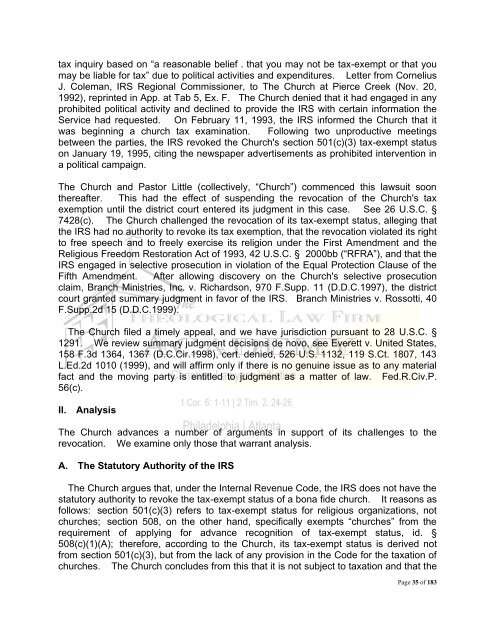The 508(c)(1)(a) Initiative Workshop
The 508(c)(1)(a) Initiative Workshop
The 508(c)(1)(a) Initiative Workshop
Create successful ePaper yourself
Turn your PDF publications into a flip-book with our unique Google optimized e-Paper software.
tax inquiry based on “a reasonable belief ․ that you may not be tax-exempt or that you<br />
may be liable for tax” due to political activities and expenditures. Letter from Cornelius<br />
J. Coleman, IRS Regional Commissioner, to <strong>The</strong> Church at Pierce Creek (Nov. 20,<br />
1992), reprinted in App. at Tab 5, Ex. F. <strong>The</strong> Church denied that it had engaged in any<br />
prohibited political activity and declined to provide the IRS with certain information the<br />
Service had requested. On February 11, 1993, the IRS informed the Church that it<br />
was beginning a church tax examination. Following two unproductive meetings<br />
between the parties, the IRS revoked the Church's section 501(c)(3) tax-exempt status<br />
on January 19, 1995, citing the newspaper advertisements as prohibited intervention in<br />
a political campaign.<br />
<strong>The</strong> Church and Pastor Little (collectively, “Church”) commenced this lawsuit soon<br />
thereafter. This had the effect of suspending the revocation of the Church's tax<br />
exemption until the district court entered its judgment in this case. See 26 U.S.C. §<br />
7428(c). <strong>The</strong> Church challenged the revocation of its tax-exempt status, alleging that<br />
the IRS had no authority to revoke its tax exemption, that the revocation violated its right<br />
to free speech and to freely exercise its religion under the First Amendment and the<br />
Religious Freedom Restoration Act of 1993, 42 U.S.C. § 2000bb (“RFRA”), and that the<br />
IRS engaged in selective prosecution in violation of the Equal Protection Clause of the<br />
Fifth Amendment. After allowing discovery on the Church's selective prosecution<br />
claim, Branch Ministries, Inc. v. Richardson, 970 F.Supp. 11 (D.D.C.1997), the district<br />
court granted summary judgment in favor of the IRS. Branch Ministries v. Rossotti, 40<br />
F.Supp.2d 15 (D.D.C.1999).<br />
<strong>The</strong> Church filed a timely appeal, and we have jurisdiction pursuant to 28 U.S.C. §<br />
1291. We review summary judgment decisions de novo, see Everett v. United States,<br />
158 F.3d 1364, 1367 (D.C.Cir.1998), cert. denied, 526 U.S. 1132, 119 S.Ct. 1807, 143<br />
L.Ed.2d 1010 (1999), and will affirm only if there is no genuine issue as to any material<br />
fact and the moving party is entitled to judgment as a matter of law. Fed.R.Civ.P.<br />
56(c).<br />
II. Analysis<br />
<strong>The</strong> Church advances a number of arguments in support of its challenges to the<br />
revocation. We examine only those that warrant analysis.<br />
A. <strong>The</strong> Statutory Authority of the IRS<br />
<strong>The</strong> Church argues that, under the Internal Revenue Code, the IRS does not have the<br />
statutory authority to revoke the tax-exempt status of a bona fide church. It reasons as<br />
follows: section 501(c)(3) refers to tax-exempt status for religious organizations, not<br />
churches; section <strong>508</strong>, on the other hand, specifically exempts “churches” from the<br />
requirement of applying for advance recognition of tax-exempt status, id. §<br />
<strong>508</strong>(c)(1)(A); therefore, according to the Church, its tax-exempt status is derived not<br />
from section 501(c)(3), but from the lack of any provision in the Code for the taxation of<br />
churches. <strong>The</strong> Church concludes from this that it is not subject to taxation and that the<br />
Page 35 of 183
















